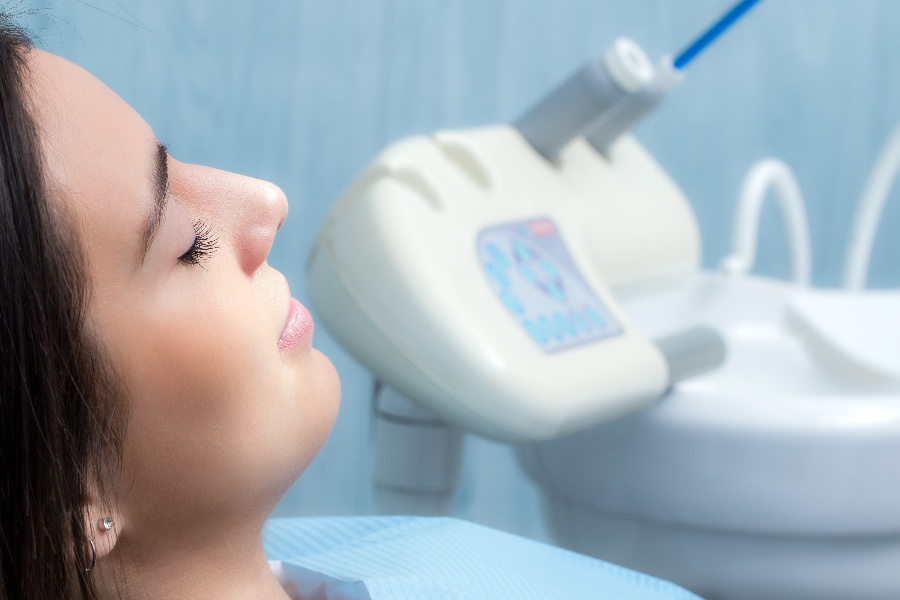Dental treatment causes some individuals to experience fear and anxiety that often leads to completely avoiding regular dental care. According to the researchers, 50-80% of adults have mild to severe dental anxiety. Fortunately, your dentist has several strategies that can help you manage dental anxiety and receive professional oral health care.
Dental Anxiety and Its Impact on Oral Health
The stress of sitting through dental treatment can be significant enough to prevent receiving needed oral health care. The impact of dental anxiety includes:
- Avoiding routine dental care, including check-ups, cleanings, and fillings.
- Having poor oral health which can lead to many dental problems, such as tooth decay and gum disease.
- Requiring more extensive dental treatment in the future as oral health deteriorates.
- Missing out on the many advantages of modern dentistry due to past traumatic dental experiences or fear of needles or injections.
Your dentist has strategies to help manage dental anxiety, including relaxation techniques such as deep breathing, meditation, and dental sedation options. You can work with your oral health professionals to develop a plan that addresses your unique concerns to help you feel more comfortable and in control during dental appointments.
Seeking regular dental care, even with the help of sedation or other anxiety-reducing techniques, is crucial for maintaining good oral health and overall wellness.
While there are many causes of dental anxiety, here are several things to keep in mind:
Types of Sedation Dentistry
Three different types of sedation dentistry are available, each with unique benefits.
Nitrous oxide. Also known as laughing gas, nitrous oxide is a type of sedation inhaled through a mask placed over your nose. It can help you relax and feel at ease during dental procedures. Its unique advantages include the following:
- Takes effect within minutes.
- Wears off quickly, allowing you to resume your daily activities.
- Safe for most patients, including children and pregnant women.
- Does not require an injection or the use of needles.
2. Oral sedation. This type of sedation involves taking medication in pill form before your dental procedure. It is a moderate sedative that helps you relax and feel calm. The benefits include:
- Providing a deeper level of relaxation than nitrous oxide.
- Being suitable for more lengthy procedures.
- Not requiring an injection or the use of needles.
- Being taken an hour before the procedure.
3. IV sedation. Intravenous sedation is administered through a vein in your arm. It's a deep sedative that puts you in twilight sleep. It is most helpful to:
- Provide complete relaxation and pain relief.
- Relieve severe dental anxiety for lengthy procedures.
- Allow the dentist to control the level of sedation more precisely.
Each type of sedation dentistry has its benefits and drawbacks, and your dentist will help you determine which option is best suited for your needs. However, no matter which sedation option you choose, it is essential to disclose your medical history and any current medications you may be taking to avoid any adverse reactions or complications during the procedure.
Who Can Benefit From Sedation Dentistry?
While sedation dentistry can benefit anyone who experiences dental anxiety, certain individuals may particularly benefit from this approach, including:
- Individuals with dental anxiety or phobia. For those who experience anxiety or phobia related to dental procedures, sedation dentistry can help alleviate these fears and make the experience more comfortable and less stressful.
- Patients with a strong gag reflex. Some individuals have a strong gag reflex, making it difficult to receive certain dental treatments. Sedation can help relax the muscles and make it easier to receive treatment without triggering the gag reflex.
- Patients with difficulty sitting still. For patients who have a problem sitting still or remaining calm during dental procedures, sedation can help them relax and stay still, making the procedure more efficient and less stressful for both the patient and the dentist.
- Individuals with sensitive teeth. Some people have particularly sensitive teeth that can make dental procedures uncomfortable or painful. Sedation can reduce discomfort and make the experience more tolerable.
- Patients with a low pain threshold. For patients with a low pain threshold, sedation can help reduce their pain perception and make the procedure more manageable.
- Those who require a long or complex procedure. For lengthy or complex dental procedures, sedation can help patients remain calm and relaxed for an extended time, making the procedure more manageable and less stressful.
- Patients with special needs. For patients with physical or cognitive disabilities, sedation can help them remain calm and comfortable during dental procedures, making it easier for the dental team to provide the necessary care.
- Patients with TMJ disorders. Patients with temporomandibular joint (TMJ) disorders can experience pain and discomfort during dental procedures due to the stress on their jaw. Sedation can help these patients relax their jaw muscles, reducing pain and discomfort.
- Individuals with a strong fear of needles. For patients afraid of needles, sedation dentistry can help them avoid the discomfort of local anesthesia injections, allowing them to receive the necessary treatment without fear or anxiety.
- Patients with a history of traumatic dental experiences. Patients who have experienced traumatic dental procedures may hesitate to seek dental care. Sedation dentistry can help alleviate anxiety and fears associated with these past experiences, making it easier for patients to receive necessary treatment.
The Benefits of Sedation Dentistry
The benefits of sedation dentistry include the following:
- Reduced anxiety. Sedation dentistry can help reduce stress and make dental procedures more comfortable and manageable for patients and the dental team.
- Pain relief. Sedation dentistry can help reduce pain during and after dental procedures, which can be particularly helpful for patients undergoing lengthy or invasive treatments.
- Increased comfort. Sedation dentistry can give patients a deeper level of relaxation and comfort during dental procedures, making them feel more at ease and less likely to experience discomfort or pain.
- Time efficiency. Sedation dentistry can help save time during dental procedures by allowing dentists to work more quickly and efficiently without causing the patient discomfort or pain.
- Increased patient satisfaction. Surveys reveal high patient satisfaction with dental treatments performed with dental sedation. This leads to patients being more willing to pursue additional needed treatment.
- Reduced gag reflex. Some patients have a sensitive gag reflex, making dental procedures uncomfortable or difficult. Sedation dentistry can help reduce the gag reflex, making it easier for dentists to work on the patient's teeth without causing discomfort or interruption.
- Safe and effective. Sedation dentistry is a safe and effective way for patients to manage their dental anxiety and discomfort and receive proper oral health care.
- Better results. By allowing patients to remain calm and relaxed during dental procedures, sedation dentistry can help dentists work more effectively and efficiently, leading to better results.
Schedule an Appointment
To learn more about the sedation dentistry options at Palmetto Dental Arts, call or contact us online.



